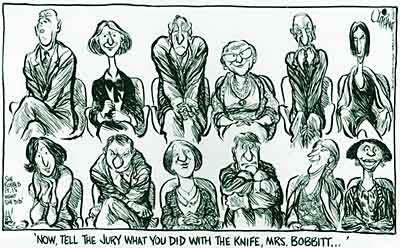10c. Crime and Due Process

Some Americans feel so strongly about their Fourth Amendment rights that they're willing to demonstrate dramatically in favor of them. Pat Barber of Texas was ordered by the state to destroy this sign on his ranch, an order he is appealing on First Amendment grounds.
Inherit the Wind. The Practice. The People vs. O.J. Simpson.
Whether a trial is depicted in a movie, on television, or in real life, Americans cannot seem to turn away. From the crime itself, to the arrest, to the jury's verdict, Americans have been fascinated by the justice system.What rights can Americans claim if they are accused of crimes? The 4th, 5th, 6th, and 8th Amendments provide much of the constitutional basis of these rights.
The Principle of Due Process
Due process means that laws must be applied fairly and equally to all people, especially to a citizen accused of a crime. The Constitution uses the phrase in the 5th and 14th Amendments, declaring that the government shall not deprive anyone of "life, liberty, or property, without due process of law..." The 5th Amendment protects people from actions of the federal government, and the 14th protects them from actions by state and local governments.
Searches and Seizures
The purpose of the 4th Amendment is to deny the national government the authority to make general searches and seizures of property. A major issue over the years has been the interpretation of "unreasonable" searches and seizures. The rules can be complicated. They also change often, but the general principle is that searches are valid methods of enforcing law and order, but unreasonable searches are prohibited.
Fourth Amendment
The right of the people to be secure in their persons, houses, papers, and effects, against unreasonable searches and seizures, shall not be violated, and no Warrants shall issue, but upon probable cause, supported by Oath or affirmation, and particularly describing the place to be searched, and the persons or things to be seized.
Over the years, the Supreme Court has interpreted the 4th Amendment to allow the police to search the following:
- The person arrested
- Things in plain view of the accused person
- Places or things that the arrested person could touch or reach or are otherwise in the person's "immediate control"
- Property where there is strong suspicion that a person could be in immediate danger
The Fifth Amendment
The 5th Amendment requires that a citizen cannot be accused of a serious crime without a grand jury investigation. It also forbids double jeopardy — the act of bringing a person to trial a second time for the same crime.
Fifth Amendment

Juries like the one in this political cartoon are required by the Seventh Amendment in federal cases
No person shall be held to answer for a capital, or otherwise infamous crime, unless on a presentment or indictment of a Grand Jury, except in cases arising in the land or naval forces, or in the Militia, when in actual service in time of War or public danger; nor shall any person be subject for the same offense to be twice put in jeopardy of life or limb; nor shall be compelled in any criminal case to be a witness against himself, nor be deprived of life, liberty, or property, without due process of law; nor shall private property be taken for public use, without just compensation.
The Fifth Amendment also grants the right to a defendant to refrain from testifying against himself or herself. Probably the most famous modern interpretation of this provision is the right to remain silent. The famous Miranda v. Arizona (1966) case required that individuals arrested for a crime must be advised of their right to remain silent and to have counsel present. This intended to prevent forced or involuntary confessions under police pressure. Although the Supreme Court had long held that involuntary confessions could not be used in federal courts, state courts did not always comply. Now local police departments must issue warnings known as "Miranda Rights" to people that they arrest.
A very important principle related to the 4th and 5th Amendments is the exclusionary rule, which upholds the principle that evidence gathered illegally cannot be used in a trial.
The 6th Amendment and Right to Counsel
The 6th Amendment guarantees that an individual accused of a crime has the right "to have the assistance of counsel for his defense."
Sixth Amendment
In all criminal prosecutions, the accused shall enjoy the right to a speedy and public trial, by an impartial jury of the State and district wherein the crime shall have been committed, which district shall have been previously ascertained by law, and to be informed of the nature and cause of the accusation; to be confronted with the witnesses against him; to have compulsory process for obtaining witnesses in his favor, and to have the Assistance of Counsel for his defense.
What is a person can't afford to have a lawyer for his or her defense? Until the 1963 ruling in Gideon v. Wainwright, many states did not ensure this right. Clarence Earl Gideon could not afford counsel when he went to trial for breaking into a poolroom in Bay Harbor, Florida. He was convicted and sent to prison, where he spent years researching his rights. Finally, he successfully petitioned the Supreme Court to hear his case, and they ruled in Gideon's favor, ensuring the right to counsel in state as well as federal courts.
The 8th Amendment and Cruel and Unusual Punishment
The 8th Amendment prohibits "cruel and unusual punishments," a concept rooted in English law. But again, what does the phrase really mean? By far, the most controversial issue that centers on the 8th Amendment is capital punishment, or the practice of issuing death sentences to those convicted of major crimes.
Eighth Amendment
Excessive bail shall not be required, nor excessive fines imposed, nor cruel and unusual punishments inflicted.
In general, states are allowed to pursue their own policies regarding capital punishment. The Supreme Court did not challenge the death penalty until 1972 in Furman v. Georgia. Even then, it did not judge capital punishment to be cruel and unusual punishment. It simply warned the states that the death penalty was to be carried out in a fair and consistent manner.
Rights of those accused of crimes are protected in other parts of the Constitution. For example, Article I affirms the right of a writ of habeas corpus, a court order that requires a judge to evaluate whether there is sufficient cause for keeping a person in jail. However, the most extensive protections are found in the 4th, 5th, 6th, and 8th Amendments.







